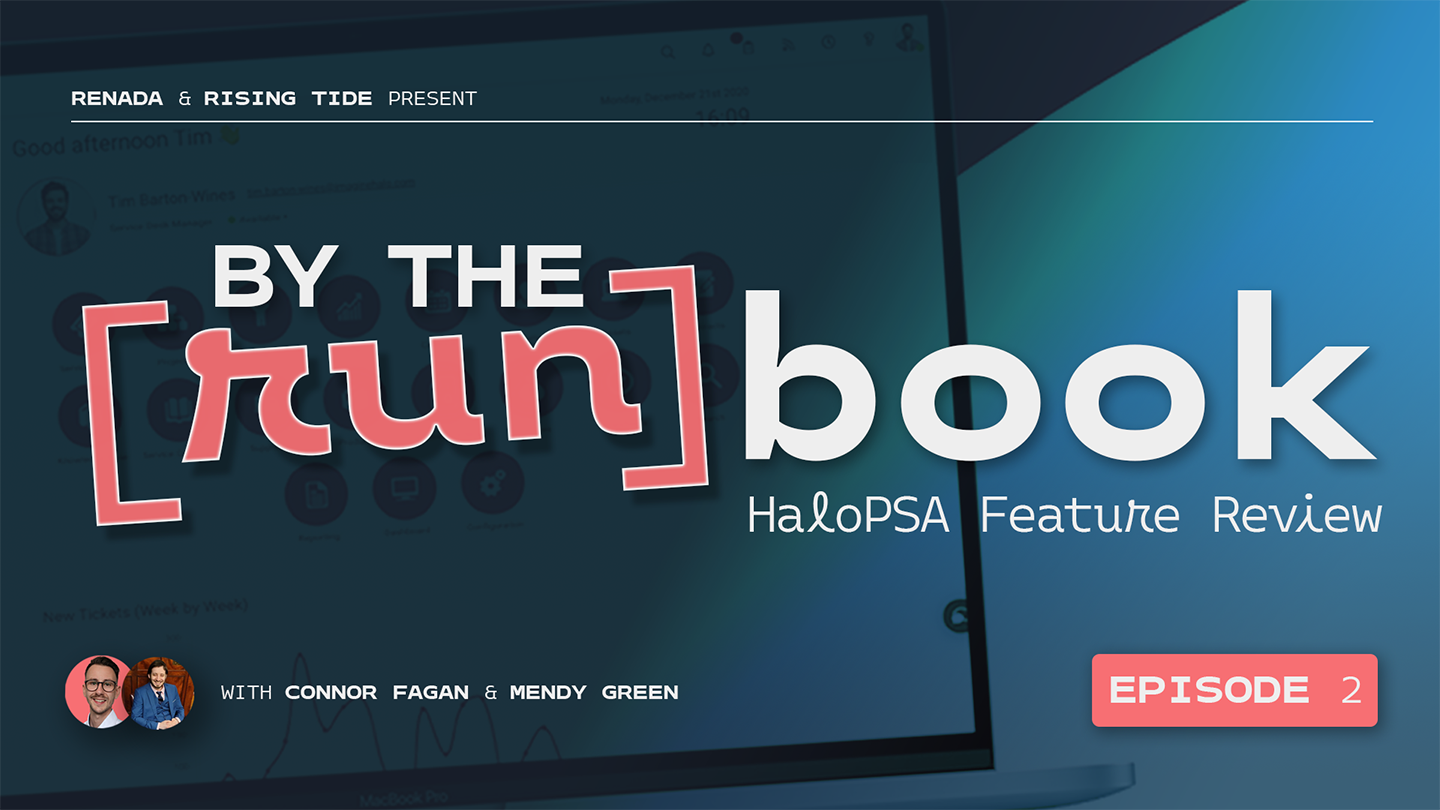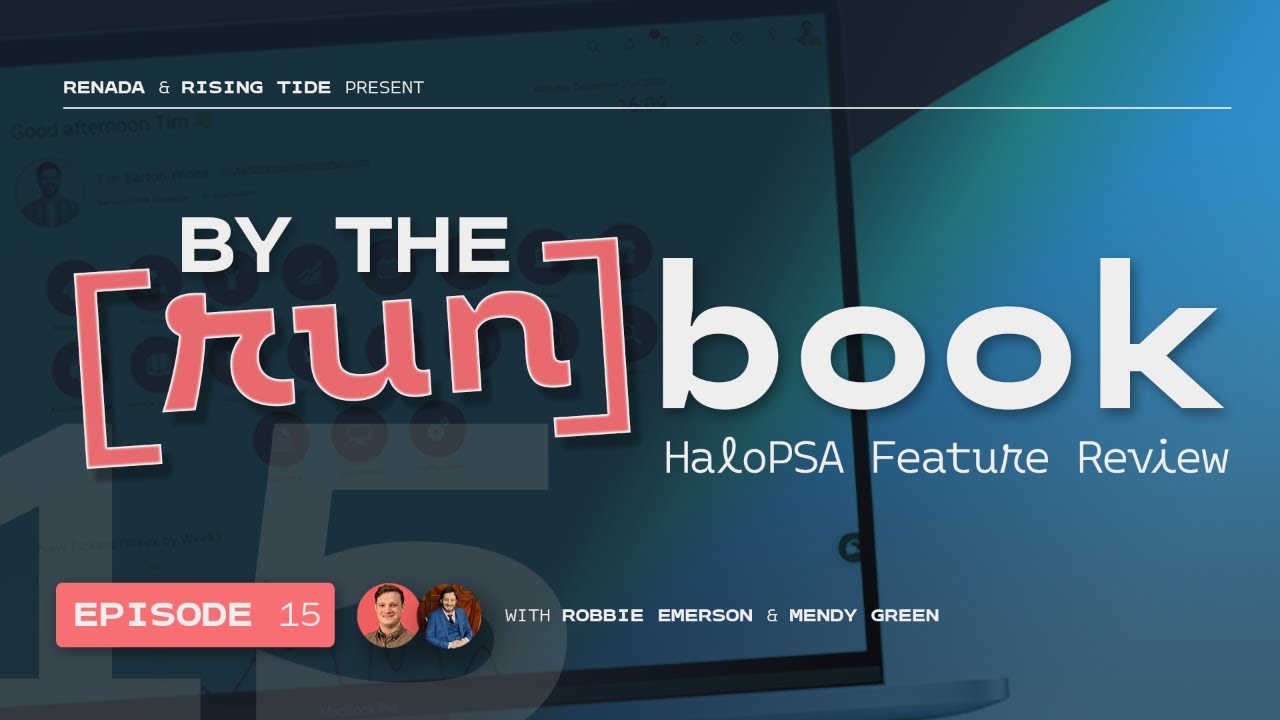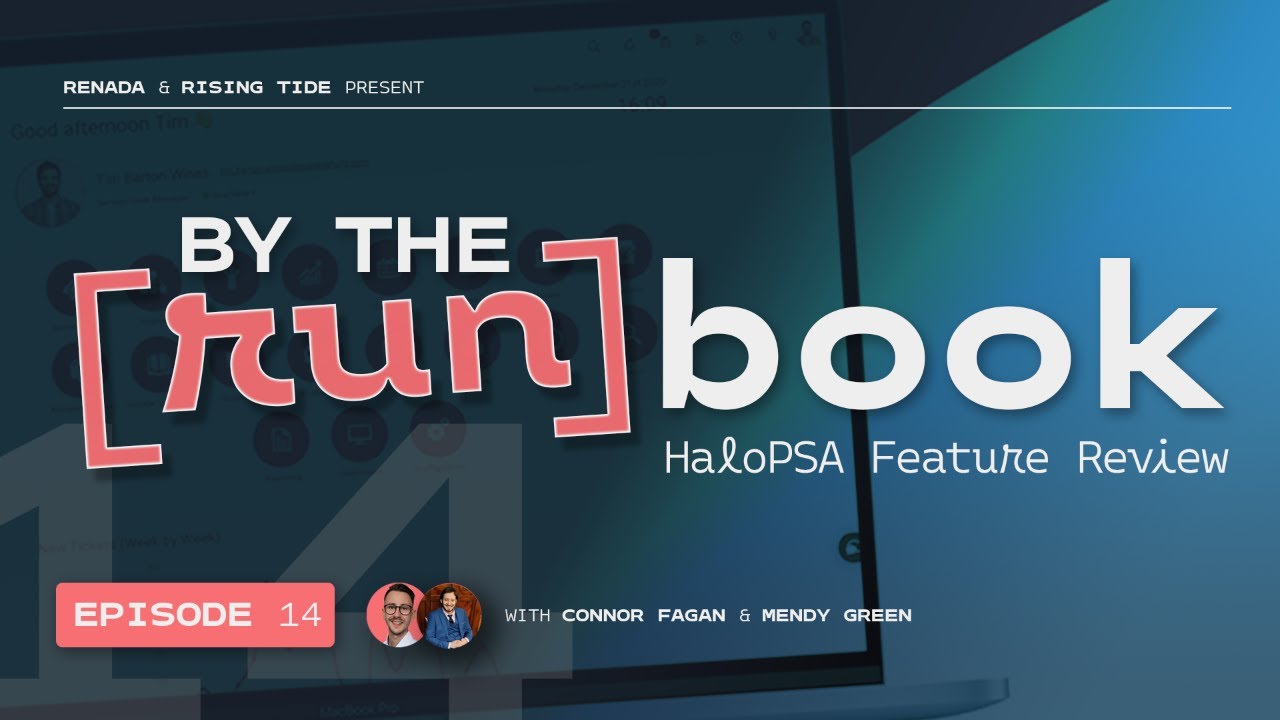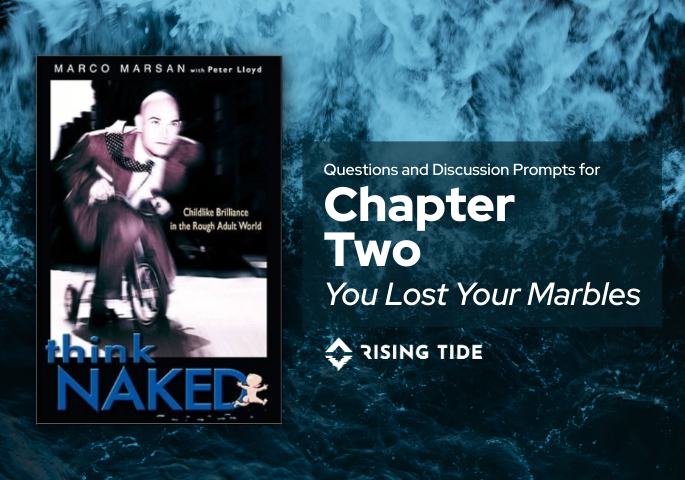By
El Copeland
July 8, 2025
•
20 min read
Tutorials
Solutions
News

HaloPSA version 2.188 brought a variety of usability and backend enhancements—from runbook triggers in chat to finer-grain billing logic and cleaner settings layouts. In Episode 2, Mendy and Connor walk through these updates, troubleshoot common gotchas, and share the kind of real-world implementation advice you can only get from people deep in the trenches. They also made a point to mention a few times to add feature requests at ideas.halopsa.com
Watch now: https://youtube.com/live/6tjM4SGOcB4
Busy MSP? This guide recaps the episode’s major updates, links you to key moments in the video, and flags anything that might deserve extra caution in deployment.
Join us July 22, 2025 for Episode 3, where we'll start to cover v2.190!
Chat flows can now kick off integration commands—including runbooks. Embed chat on your website or in Teams, and let Halo handle the routing. You could:
⚠️ Be careful what runbooks you expose publicly—especially if they modify data.
You can now toggle the notification sound on or off—but the visual popup still appears. You still can’t upload custom sounds, and notifications can get out of hand across tabs.
💡 Bonus tip: You can suppress sound notifications per rule, but they may still clutter the alert pane.
Enable WebSockets for faster, real-time alerts instead of using the default polling (heartbeat). This reduces delay in receiving internal or backend alerts.
Debug runbooks, automations, email failures, and integration issues using the new service monitoring pane. It logs each backend action so you can pinpoint where workflows failed.
🔍 You no longer need to email Halo support for log digging—huge time-saver.
You can now set separate rates for time and distance in a single travel charge entry. Perfect for billing both mileage and technician transit time in a single step.
Settings like mailboxes, templates, and rules have been reorganized into distinct tabs instead of being buried under “General.” More logical, but prepare for some retraining of your internal muscle memory.
Set a contract status to auto-expire when the end date passes. A scheduled task now flips expired contracts to “inactive” if configured.
⚠️ Hidden contracts can cause trouble—pair this with automated tickets or alerts to track renewal conversations.
You can now:
Connor and Mendy share tips for keeping messy product catalogs from polluting QuickBooks/Xero.
To-do groups can now be restricted to specific customers. Use this to tailor onboarding checklists, project tasks, or compliance processes.
⚠️ Only one customer per group for now. Feels clunky, but it’s a start.
Quickly duplicate complex billing logic with a new “Clone” button. Ideal for MSPs using multiple templates per client or those needing custom combinations for each contract type.
Billing plan rules can now reference:
Use this to get laser-precise about when a contract or billing model should apply.
Choose between traditional storage (custom fields added to core tables) or a new “separate table” method. The latter avoids bloating system tables—but still stores multi-selects as comma-separated strings (ugh).
You can now import vendor quote spreadsheets directly into Halo quotes. Set up mappings for Cisco, Dell, or distributor quote templates and save serious time.
You’re no longer stuck using Halo’s shared apps. Bring your own app registration to limit scopes, improve auditing, and align with internal security policy.
A new setting condenses prorated adjustments into a single invoice line (instead of two). Easier to read—but harder to debug.
🔍 Consider leaving this disabled unless your team fully understands the logic.
The HubSpot sync continues to be... challenging:
Proceed with extreme caution or disable it entirely.

Episode 15 of By the [run]Book covers Halo v2.208 and starts into v2.210, with Mendy and Robbie walking through SLA refinements, shifts/time tracking updates, billing cadence improvements, and tighter access controls across portals and reporting. Key moments include new SLA response targeting options, a clock-in/clock-out widget for shifts, a bi-monthly schedule period, and expanded team leader controls. This is a useful episode for MSPs looking to tighten operational workflow, reporting governance, and self-service experience improvements.
Watch Now: By the [run]Book: Episode 15
For easier tracking, check out haloreleases.remmy.dev to filter and search HaloPSA updates by ID, version, and keyword.
Adds an SLA option so your first response target can differ from subsequent response targets.
Adds the FAQ List Ticket field as a workflow criteria option.
Allows ticket end-user updates when an anonymous chat is successfully upgraded.
Adds a clock in/clock out widget for Shifts.
Adds a 2-month schedule period option.
Improves Knowledge Base latest article links.
Adds “Visible - Read Only” for Agent Asset details visibility.
Adds load-balance on reopen if assigned agent doesn’t meet qualification rules.
Introduces a module for an Opinyin integration.
Adds test email sending for individual mail campaign messages.
Adds new Halo API actions in runbooks.
Splits KB view counts so end users see only user views (when enabled).
Adds item group restrictions + running cost total on portal ticket item selection.
Adds a Ticket Reference field that’s searchable and usable in column profiles.
Groups service subscribers.
Adds $ variables for CONTRACTSLA, CONTRACTSUBTYPE, CONTRACTSTATUS.
Adds improvements to Agent Resource Booking.
Adds encryption options for variables/responses in integrations/runbooks.
Adds software expiry date tracking on assets.
Adds ticket-type control for end-user approval action visibility.
Allows team leaders to modify agents’ preferences.
Adds bulk add assets via the asset search modal.
Adds chat profile overrides at the user role level.
Allows KB links to include FAQ lists and auto-expand on open.
Allows HTML formatting in popup notes triggered by ticket rules.
Shows credit notes alongside invoices in the portal.
Adds a setting to limit users/agents to one active session.
Adds TD Synnex Quote Line Imports.
Adds dark mode counter widget color options.
Adds downpayment invoice creation from sales orders (fixed price + T&M).
Adds settings to limit portal options to Web Access Level list values.
Adds access control for reports.
Adds a deep link button on imported Addigy devices.
Multiple changes made to the Expenses list.
Allows embedding Halo portal/agent UI (including dashboards) in SharePoint via iframe.
Changes how recurring invoices appear/create based on month selection.
Ensures billing template application creates a billing plan record per matching contract/agreement.
Adds Last Contacted + Created Date fields to NinjaOne device import.
Removes quote “Send” button so sending happens only via ticket/opportunity.
Disables change history tracking for selected asset fields.
Adds invoice access restriction levels (No Access/Site/Client).
Shows the overriding contract field even if it isn’t on the field list (admin-editable only).
Enables database lookup while entering an action in the self-service portal.
Updates the Account Integrator for Sage UK v32 (2026).
Adds a setting to group ticket entities separately during invoice creation.

In Episode 14 of By the [run]Book, Mendy and Robbie wrap up v2.206 and dive into v2.208. Join us while they unpack a dense set of workflow, billing, automation, and self-service portal enhancements. Highlights include conditional workflow steps, improved qualification matching, project–contract alignment, and powerful new portal customization options. This episode is ideal for MSPs who want tighter operational control, cleaner billing, and more flexible automation inside HaloPSA.
The following features stand out as a few of the impactful changes:
On-call Notification Enhancements #422926
Halo introduced various enhancements to notifications to better support on-call workflows, and Mendy called out that this release note quietly included a massive underlying change. The key takeaway was that important platform-impacting updates can be buried in “notification” notes, so MSPs running on-call should review notification behavior closely after updating.
Assign Contract to Projects & Tasks Created from Sales Orders #1027598
Projects and tasks created from sales orders can now automatically inherit the contract created from that sales order, tightening the link between quoting, delivery, and billing. The hosts emphasized this as a practical fix for MSPs who see project time accidentally hitting the wrong agreement (and wrecking profitability reporting), especially when doing fixed-fee or prepaid project work.
Workflow Automations Using Client/Site/User Custom Fields #1022399
Workflow automations can now use client, site, or user custom fields directly as criteria, reducing the need for workaround runbooks that copy those values onto tickets. The hosts positioned this as a meaningful automation upgrade because it makes routing and logic cleaner, easier to maintain, and more scalable for MSPs with account-specific processes.
Watch Now: By the [run]Book: Episode 14
For easier tracking, check out haloreleases.remmy.dev to filter and search HaloPSA updates by ID, version, and keyword.
Full Feature List:
Added the ability to add Azure/Entra distribution groups as followers | v2.206 #770320 | 1:52
Added an option in AI settings to generate an AI summary of the article based on the title, description and resolution Added an option in AI settings to use the AI-generated summary of an article to identify and flag potential duplicate articles before submission | v2.206 #767579 | 2:58
When tickets have a Teams chat open, if the ticket is closed, a closure message will be sent to all chats | v2.206 #635732 | 3:29
Various enhancements to notifications to support on-call notifications | v2.206 #422926 | 4:02
A setting has been added to Sales Order Configuration so that a specific Status can be set once all Items on the Sales Order are consigned | v2.208 #1034330 | 10:24
The setting "Tickets with the default Organisation/Site must be moved before working on the Ticket" can now be overridden at Ticket Type level | v2.208 #1033540 | 12:51
"Do not disturb" mode for Halo notifications | v2.208 #1028655 | 16:04
A setting "When creating Projects and Tasks assign the Contract created from the Sales Order" has been added to Configuration > Sales Orders > Processing Sales Order Lines that allocates Projects and Tasks created from Sales Orders to the Contract created from the Sales Order | v2.208 #1027598 | 17:27
An Item property had been added to the Milestone so that the Invoice Item can be edited/set after creation of the Milestone. This Item will be used when creating an Invoice directly for the Milestone only | v2.208 #1027578 | 20:33
Added Canned Text Shortcuts for Chat | v2.208 #1024945 | 23:07
Additional data has been added to the Invoice Line object to store the Origin Sales Order Line that the associated Recurring Invoice was created from and to store the Occurrence Count for Recurring Invoices | v2.208 #1024614 | 28:23
Report display improvement when using customised table html | v2.208 #1024326 | 28:55
Added Managed Identity via Azure Arc as an authentication option to the Microsoft Entra integration and Office 365 mailboxes | v2.208 #1024317 | 29:36
It is now possible to set a Tax Exemption reason for a Halo Customer on creation that will be pushed to Quickbooks when the Customer is not taxable | v2.208 #1024297 | 29:44
A setting has been added to allow recurring invoice lines to be hidden by default when viewing the recurring invoice | v2.208 #1024067 | 29:57
Multiple changes to available $ variables | v2.208 #1023687 | 32:18
Added the setting 'Automatically create Change Advise Boards from Teams' to Approval Process settings | v2.208 #1023311 | 32:55
A setting has been added to the QuickBooks Integrations setup so that a Closed Date can be entered. | v2.208 #1022558 | 33:16
You can now use Client, Site or User Custom Fields for criteria on Workflow Automations | v2.208 #1022399 | 33:41
The variable $ SERVICEID can be used in database lookups to obtain the ID of the Service linked to the Ticket | v2.208 #1021534 | 34:21
Custom Statistics Tables added | v2.208 #1019726 | 34:32
Decimals are now allowed within the field "Tickets Opened/Closed within the last X days" in AI suggestions | v2.208 #1018082 | 37:42
Added a new Knowledge Base setting that allows you to hide FAQ tiles that have no results matching the current search in the Portal | v2.208 #1012783 | 37:50
Added a manufacturer field to the suppliers tab of assets | v2.208 #1009501 | 37:57
Improvements to Qualification matching | v2.208 #1008143 | 38:01
Various improvements to the self-service portal | v2.208 #1007918 | 40:49
You can now use Client, Site, User and Organisation level $ variables in the Self Service Portal custom HTML Headers and Footer | v2.208 #1007759 | 43:43
Enhancement to Client-Ticket Type restrictions | v2.208 #1006158 | 47:49
Added a Chat Audit Area Added a new Chat Transcript style | v2.208 #1004851 | 48:34
You can now set feedback and survey links to be single use | v2.208 #1002898 | 48:41
Added an Advanced Setting to alter the Tree menu width | v2.208 #999276 | 51:57
You can now make your custom hompage HTML in the End-User portal appear as a sticky banner across all portal pages | v2.208 #996323 | 52:48
Added option to exclude non-invoiceable time from budget calculations | v2.208 #994004 | 56:01

This discussion guide is part of Rising Tide’s Winter 2026 book club, where we’re reading Think Naked by Marco Marsan.
If you’re just joining us, here are a few pages you’ll likely benefit from:
“If you want to be more creative, stay in part a child, with the creativity and invention that characterizes children before they are deformed by adult society” - Jean Piaget
In Chapter 2, You Lost Your Marbles, Marco Marsan explores how people don’t simply “grow out” of creativity — they are systematically conditioned out of it. The chapter argues that over time, fear, rigid rules, institutional norms, and social conformity slowly strip away curiosity, playfulness, and experimentation.
Marsan frames this loss through several forces:
The chapter opens with a consulting story where a leader dismisses Marsan outright, using it as a framing device to explore how organizations often reject discomfort, challenge, and unconventional thinking — even when they claim to want innovation.
Use these open-ended prompts to guide reflection and conversation. Remember, there are no right answers!
Rising Tide helps MSPs and service-focused teams build better systems: the kind that align people with purpose.
Every Friday at 9:30 AM ET, we host Rising Tide Fridays as an open conversation for MSP owners, consultants, and service professionals who want to grow both professionally, technically, and emotionally. In Winter/Spring 2026, we’re walking through Think Naked.
If that sounds like your kind of crowd, reach out to partners@risingtidegroup.net for the Teams link. Bring your coffee and curiosity…no prep required.